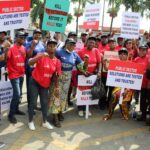Again, Organised Labour, CSOs advocate deprivation and remunicipalization of Assets
By Edu Abade
The Amalgamated Union of Public Corporations, Civil Service Technical and Recreational Services Employees (AUPCTRE) and the National Union of Electricity Employees (NUEE) have again rejected failed privatization of Nigeria’s power sector and plans by the federal and some state governments to transfer water services to private individuals.
Participants at a symposium organized by AUPCTRE and NUEE with support of the Public Services International (PSI), DGB Bildungs Werk, as well as their Nigerian partners, made the resolution in Lagos, insisting that failed transfers of public assets to private investors, especially in the power sector, should be reversed.
At the symposium on The Socio-Economic and Political Implications of Privatisation of Public Assets, Utilities: The Way Forward, they reviewed the electricity sector privatization of 2013 and ongoing plans by the Federal Government and some state governments like Lagos to privatize water assets and utilities.
Speaking, the National President of AUPCTRE, Comrade Benjamin Anthony, said organized labour and civil society groups must confront and resist privatization in any guise, either in the water or electricity sector.

 He explained that the failure of the electricity sector privatization, which was consummated in 2013, was predicted, and the same fate would meet the water sector unless ongoing advocacy for its halt is sustained.
He explained that the failure of the electricity sector privatization, which was consummated in 2013, was predicted, and the same fate would meet the water sector unless ongoing advocacy for its halt is sustained.
Also speaking, Prof. Mande Hosea Mangu, who presented the keynote address titled Weaning Nigeria of Privatization in the Age of Remunicipalization and Democratic Control of Public Utilities,stressed the need to terminate all failed privatization programs and a return to remunicipalization.
A panel session on People Power versus Corporate Takeover of Public Assets, comprising members of organized labour and civil groups, set the tone for recommendations on how labour and civil society could foster robust collaborations to reverse the privatized entities and stop those currently in the works.
A highlight of the symposium was a protest march in Ikeja by the participants to express their rejection of privatization of state assets and utilities and a demand for the reversal of the electricity sector privatization.
At the end of the discussions, participants observed that the electricity sector privatization of 2013 has failed Nigeria’s over 200 million people, as power generation has continued to oscillate between 4,000 megawatts and 5,800 megawatts since the exercise was carried out.
“Incessant power grid collapse, with the most recent representing the 24th crash in 2024, is a huge embarrassment to the nation. Nigerians now depend on their own power generation through electric generators at huge financial, environmental, and health costs.
“The incessant hike in electricity tariffs and the balkanization of Nigerians into electricity bands, suggesting who should get electricity the most is unjust, creates an unnecessary class system in society as it weighs heavily against poor Nigerians who now struggle to pay for darkness.
“The recent alarm raised by the Nigerian Senate that the electricity sector privatization has failed and should be reversed represents reality, but the Upper Chamber is yet to work its talk by proposing the ideal way forward.
“There is also a growing trend whereby the power distribution companies abdicate responsibility of installing electricity infrastructure in local communities only to insist on owning those facilities after locals task themselves to put them in place.
“Ongoing plans by the federal and state governments suggesting the privatization of the nation’s water assets and utilities supported by the World Bank and other multilateral agencies and donors have become very worrisome and unsettling to Nigerians.
“Workers continue to carry the biggest burdens of privatization through job losses, displacements, and uncertainty of job security in their workplaces,” they stated.
No fewer than eight signatories endorsed the communiqué demanding reversal of privatization schemes as promoted from 1988 to 1993 under the structural adjustment program (SAP) of Nigeria’s military juntas as dictated by the Breton Woods Institutions—the World Bank and International Monetary Fund (IMF).
Besides AUPCTRE and NUEE, the Renevlyn Development Initiative (RDI), Citizens Free Service Forum (CFSF), Pan-African Vision for the Environment (PAVE), Child Health Organisation (CHO), Committee for Defence of Human Rights (CDHR), Peace and Development Project (PEDEP), and Sustainable Research and Action for Environmental Development (SRADev Nigeria) endorsed the communiqué.
They are seeking a reversal of the tariff hikes in the electricity sector and the immediate end of balkanization of Nigerians into tariff bands that create class and segregation, while asking the National Assembly to convene a public hearing to allow Nigerians to air their views on the state of electricity sector privatization.
“The World Bank and IMF suggested initiatives on privatizing Nigeria’s water assets under the Public Private Partnership (PPP) or any model that puts profits over service delivery and human rights should be stopped.
“We demand adoption of the Public-Private Partnership (PPP) model, which has proven to be successful as against privatization, which has become a conduit pipe to fleece the nation.
“There should be sustained investments in human capital development in the public sector to pave the way for efficiency and transparency in their operations and an end to practices that unfairly target workers in exercises aimed at strengthening government institutions. Instead, workers should be regularly trained and rated based on their performance,” the communiqué reads.
 The New Experience Newspapers Online News Indepth, Analysis and More
The New Experience Newspapers Online News Indepth, Analysis and More
